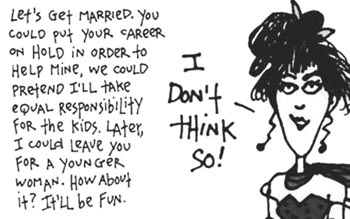Learn How To Say

Ms. Kim works for a small trading company. She is popular with her male colleagues. She willingly takes care of all her male superior"s trifles and even volunteers to make coffee. She knows very well that nonetheless she will never be asked to make important managerial decisions on her own without consulting her male co-workers first.
Park and Kim are two of the many Korean women who seek approval in today? male-dominated society in exchange for repressing their own desires and ambitions. They represent society?"good girls," who are accepted but seldom appreciated by others.
These women are victims of what is known as the "good girl complex." According to William Fezeler and Eleanor Field, two prominent American feminists, the good girl complex refers to women"s self-destructive way of thinking that they should serve and please the people around them. Society, school, and mass media have always forced women to be good: "Be a good girl,"""What a nice girl you are!""Girls are "programmed" to want to hear such praise all the time. And before they know it, they grow up to accept and abide by the characteristics society decrees as ?eminine sacrificing, passive, maternal, and sensitive.
Consequently, a girl is forever trapped inside the mold of a "good woman." If she feels that she has not lived up to society"s standards, she disparages herself and suffers from a sense of inferiority, concluding that she is "bad."
Elizabeth Hilts, a popular lecturer and author of "Getting In Touch With Your Inner Bitch," suggests in her book how to overcome this complex and for what it"s worth, become a bad girl: "Get used to saying "no"" "No" is an answer that is firm, definite, and polite.
Imagine you are out on a date with someone. You?e planned that tonight you will have a romantic dinner and will really get to know your date. But your date says he wants to take you out to the movies. Normally, the "good girl" in you would immediately delete the wonderful plan you"re been processing all night and thoroughly enjoy the movie. But, why not say, "I"d rather have dinner and get to know you better. What do you think?"
The moment you start being honest with your date and to yourself, there"s a better chance you?l develop a healthy relationship.
Today, some even think that a bad woman equals a successful woman. Hillary Clinton and Barbara Streisand are two of the many who exemplify this line of thought. They believe that being bad simply means for a woman to become stronger. ""Bad girl" is nothing but a name. It does not necessarily imply any negative feelings. However, it manages to convey a cynical attitude towards the world that demands infinite "goodness" from women. And we strongly maintain the idea," says Toma, a member of the Ewha Women"s Committee.
Toma explains that the reason why women"s un-femininity is described as "bad" is because everybody uses the male language, which defines how women must be. "This actually exposes another feminine problem the absence of a female language, she adds.
Little by little, Korean women are starting to proclaim, "I"m bad and I"m proud of it." Television mirrors women"s desires to speak out and feel good about it. Female characters today are vengeful and even bullying, but the viewers love them. Perhaps television will finally spare us all from the fairytales and happy endings of the "goody goodies." The age of good girls is over.
espirit0121@ewha.ac.kr

